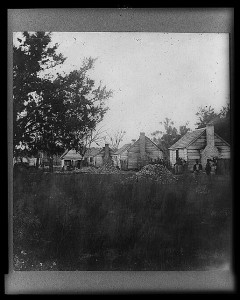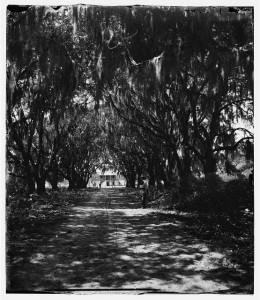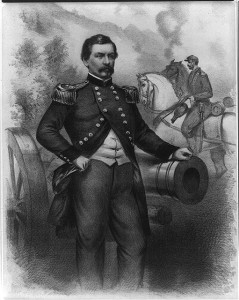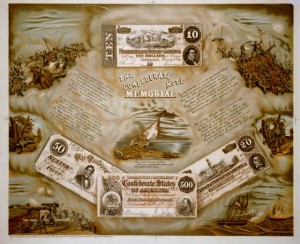
Basis for southern financial strength? Slave Quarters, Port Royal, SC (photo 1862; LOC - LC-B811- 211)
From the Richmond Daily Dispatch August 31, 1861:
A long war has its advantages.
Many in the South desire a long war. They will hardly be gratified by the Yankees, who do not desire any prolongation of a condition of things so disastrous to trade as the war. The South cannot suffer a tithe as much as the North from a long war; on the contrary, such a war will benefit her interest in many respects. They may be enumerated as follows: 1st. It weans the South from Northern supplies and relationship. 2d. It begets an independent manufacturing spirit among us. 3d. It employs our abundant supplies of food and means for carrying on war. 4th. It cultivates our military spirit, rendering our arms a terror to foes for all time to come. 5th. It will beget peace with less actual conflict in arms, as no sooner than the next presidential campaign opens at the North two parties will arise to crush each other — the Democratic or Peace party, and Lincoln’s or the Abolition party. It need surprise no one if this precious conflict opens with such men as ex-President Pierce and Vallandigham, on one side, for peace and recognition; and on the other, Lincoln, or McClellan, or Seward, with some deep-dyed individual as Vice President. Already a peace party is forming there, and if the campaign was nearer we should have but little to do South but to keep our army in the field and await the natural result of party spirit. 6th. Every one knows the quick subsidence of any feeling among the Northern people, especially in the large cities. They must have novelty upon novelty. The war has already been a long war with them. Hence the first volunteers are escaping homeward We may expect that the recruits will scarcely overbalance the returning soldiery, and that they have as large an army as they can collect. 7th. The Yankee money, though plentiful in times of peace and prosperity, is scarce in war; and for several reasons–first, a $50,000 capitalist in New York, Boston, &c., has his funds somewhat in this condition: $15,000 in a suburban villa, yielding no per cent.; $15,000 in city realty; $20,000 in bonds of various kinds — the two last paying scarcely any dividends just now. So you will perceive he can command no money for the war, if so disposed. His situation compares badly with that of a Southern farmer who owns the like amount, his being in land and negroes, say $40,000, balance in notes, all realizing even now a good profit, and enabling him to contribute to the war, by taxation or donation thousands of dollars.
A long war, therefore, will bring ruin to the North; and, should England refuse to recognize, let her so refuse, and get up a war at home. We can fight it out, if need be, without thanks to any earthly power.
I’m not an economist, but I’m not seeing how a plantation owner has more liquid assets than a northern capitalist. Maybe it is because the bond market was weak, so it would be hard to sell.
I was amazed that four years before the next U.S. presidential campaign this editorial saw McClellan as a candidate, although for the wrong party. And that seems to be part of the story. McClellan’s beliefs and conduct possibly helped make the war longer, although maybe it would have been just as long no matter who was running the Army of the Potomac. Maybe it just had to gradually dawn on people that the effort was going to have to be more of a total war.

Fire-eater can support CSA - Robert B. Rhett plantation - Beaufort, Port Royal Island, SC (1865 photo; LOC - LC-DIG-cwpb-0329)
“3d. It employs our abundant supplies of food and means for carrying on war.” Per Allen’s recommendation at Seven Score and Ten I am reading Confederate Reckoning by Stephanie McCurry. As is my wont, I’m kind of tip-toeing through the book as I read what I can during lunch breaks. (Must because I’m a Yankee and “must have novelty upon novelty”) Coincidentally, I’m at the point where, as early as 1862 into 1863, extreme scarcity and dire hardship are causing some women in some Confederate states to act out in political and/or violent ways. Of course this is well before the autumn of 1864 when Sheridan and Sherman were destroying large parts of the South and McClellan was running against Lincoln for president.



You beat me to the punch — I was going to say something about how early scarcity of food and other essentials would strike the South. It’s true that they did begin to develop more industrial capacity of their own out of necessity, but it was never enough to compensate for the lost imports due to the blockade. And of course, a lot of that planter wealth in “Negroes” had a distressing tendency to run Northward, while the Northerners’ bonds didn’t sprout legs and head south.